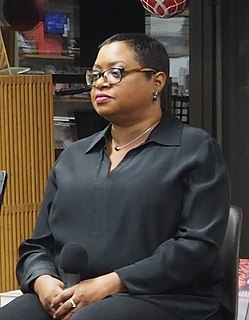A Quote by Hailee Steinfeld
My character in 'True Grit' would set these goals for herself that seemed near impossible, but to her they were possible. She was never going to believe anything else other than that.
Related Quotes
Mr. Thornton felt that in this influx no one was speaking to Margaret, and was restless under this apparent neglect. But he never went near her himself; he did not look at her. Only, he knew what she was doing — or not doing — better than anyone else in the room. Margaret was so unconscious of herself, and so much amused by watching other people, that she never thought whether she was left unnoticed or not.
There was a warmth of fury in his last phrases. He meant she loved him more than he her. Perhaps he could not love her. Perhaps she had not in herself that which he wanted. It was the deepest motive of her soul, this self-mistrust. It was so deep she dared neither realise nor acknowledge. Perhaps she was deficient. Like an infinitely subtle shame, it kept her always back. If it were so, she would do without him. She would never let herself want him. She would merely see.
When a woman is frozen of feeling, when she can no longer feel herself, when her blood, her passion, no longer reach the extremities of her psyche, when she is desperate; then a fantasy life is far more pleasurable than anything else she can set her sights upon. Her little match lights, because they have no wood to burn, instead burn up the psyche as though it were a big dry log. The psyche begins to play tricks on itself; it lives now in the fantasy fire of all yearning fulfilled. This kind of fantasizing is like a lie: If you tell it often enough, you begin to believe it.
Our main character is Klem Ristovych, the most senior detective in the MCPD. Klem's a dinosaur, the oldest cop working the Fuse, and nobody can believe she hasn't retired yet. Hell, she can hardly believe it herself. But what else is she going to do? Sit at home and watch soap operas all day? She'd throw herself out of an airlock first.
When I looked at [Fannie Lou] Hamer and that speech it seemed to me that she had to be the bravest woman ever, to come before that body and to assert her rights, when she knew that she was going lose that battle. But she did it anyway, because she knew she was speaking not just for herself and for that day, but for me, and for all the other young women who were coming behind her. She didn't know our names, but she was working for us. I find that incredibly empowering.
Yet there were times when he did love her with all the kindness she demanded, and how was she to know what were those times? Alone she raged against his cheerfulness and put herself at the mercy of her own love and longed to be free of it because it made her less than he and dependent on him. But how could she be free of chains she had put upon herself? Her soul was all tempest. The dreams she had once had of her life were dead. She was in prison in the house. And yet who was her jailer except herself?
It seemed to Alabama that, reaching her goal, she would drive the devils that had driven her - that, in proving herself, she would achieve that peace which she imagined went only in surety of one’s self - that she would be able, through the medium of the dance, to command her emotions, to summon love or pity or happiness at will, having provided a channel through which they might flow. She drove herself mercilessly, and the summer dragged on.
Yet losing him seemed unbearable. He was the one she loved, the one she would always love, and as he leaned in to kiss her, she gave herself over to him. While he held her close, she ran her hands over his shoulders and back, feeling the strength in his arms. She knew he’d wanted more in their relationship than she’d been willing to offer, but here and now, she suddenly knew she had no other choice. There was only this moment, and it was theirs.
She realized how many of her beliefs were either unrealistic or belonged to her deceased parents and her ex-husband. She also realized that her expectations for herself and others were sometimes too rigid. She was trying to live up to what everyone else said was best for her, which made her depressed and hard to be around at times. Once she changed her beliefs about herself and others, she began to smile more and enjoy life.
She emptied herself of Fabio and of herself, of all the useless efforts she had made to get where she was and find nothing there. With detached curiosity she observed the rebirth of her weaknesses, her obsessions. This time she would let them decide, since she hadn't been able to do anything anyway. Against certain parts of yourself you remain powerless, she said to herself, as she regressed pleasurably to the time when she was a girl.
She suffers as a miser. She must be miserly with her pleasures, as well. I wonder if sometimes she doesn't wish she were free of this monotonous sorrow, of these mutterings which start as soon as she stops singing, if she doesn't wish to suffer once and for all, to drown herself in despair. In any case, it would be impossible for her: she is bound.
So firm did Nivea's determination become that she wrote in her diary that she would give up marriage in order to devote herself completely to the struggle for women's suffrage. She was not aware that such a sacrifice would not be necessary, and that she would marry a man for love who would back her up in her political goals.
The adversary she found herself forced to fight was not worth matching or beating; it was not a superior ability which she would have found honour in challenging; it was ineptitude - a grey spread of cotton that seemed soft and shapeless, that could offer no resistance to anything or anybody, yet managed to be a barrier in her way. She stood, disarmed, before the riddle of what made this possible, she could find no answer.




































